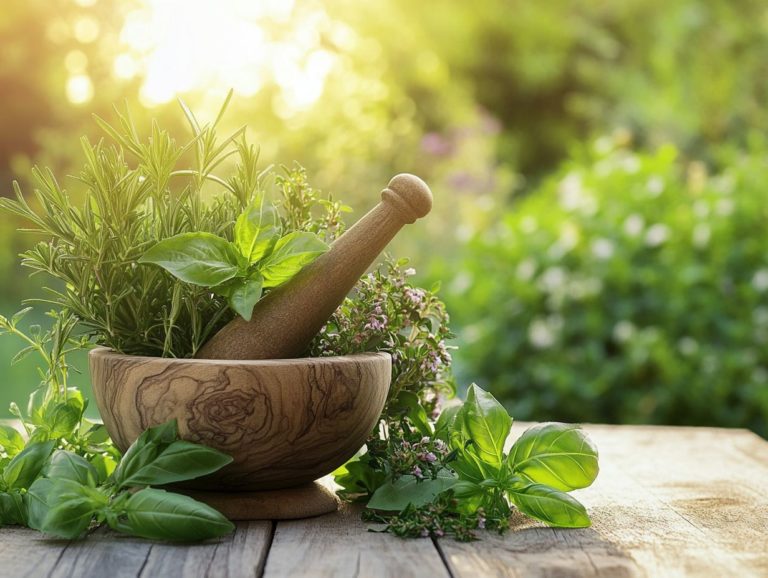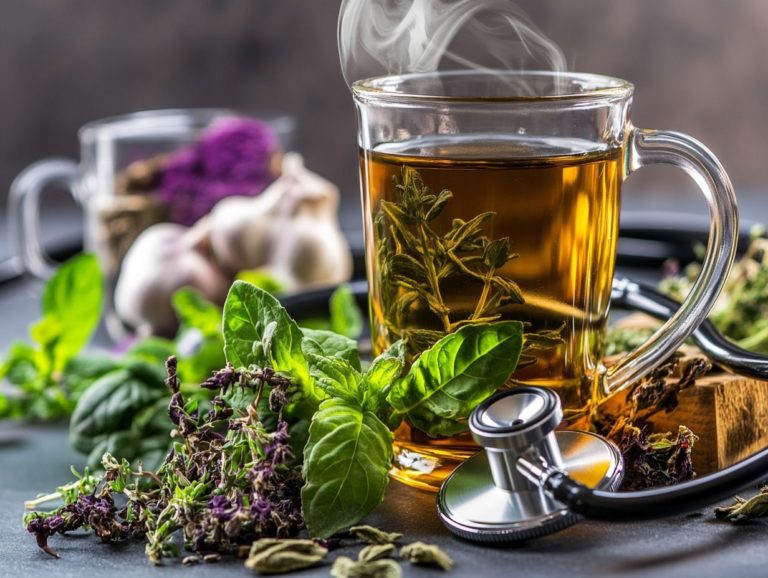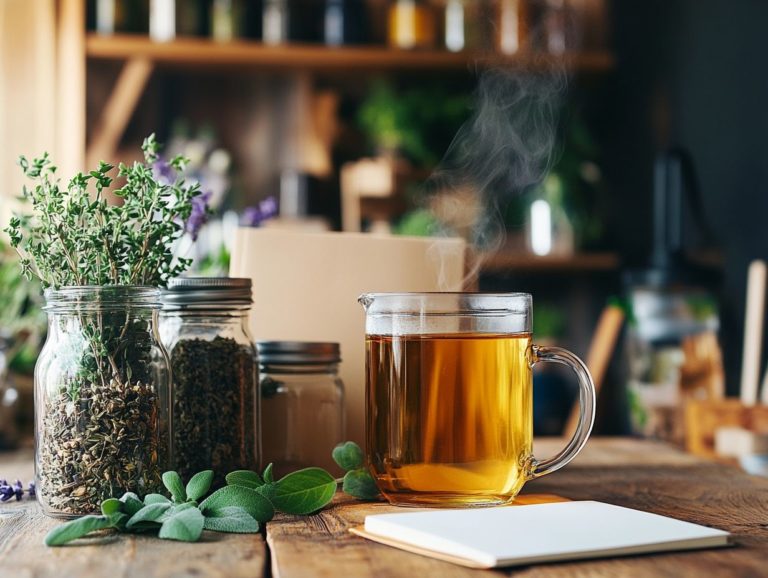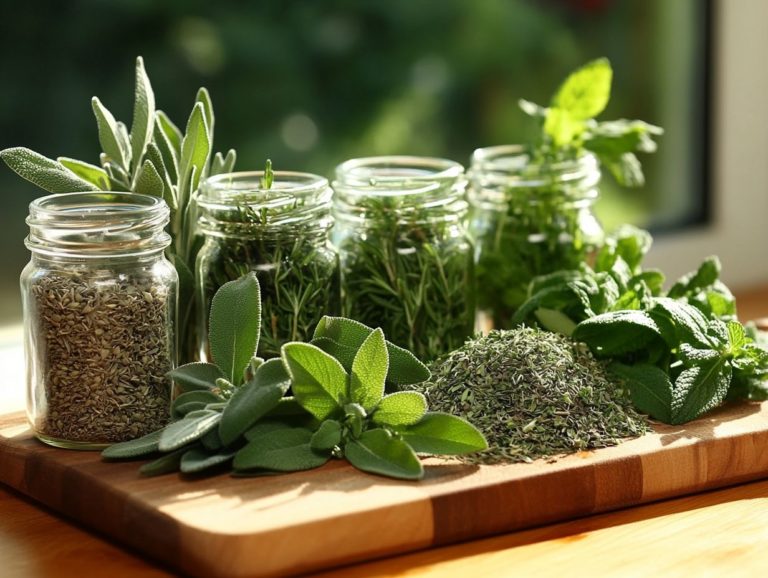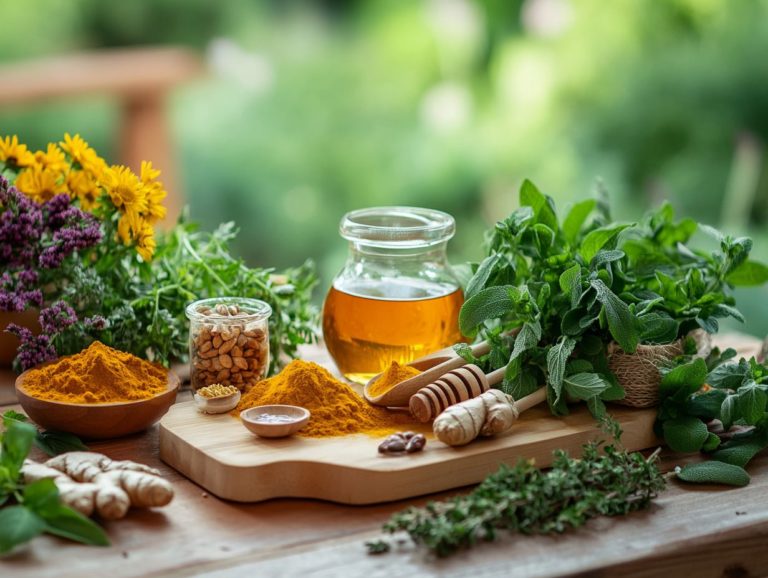Herbs for Reducing Headaches and Migraines
Are you tired of suffering from headaches and migraines? You re not alone! Headaches and migraines can be very painful, significantly affecting your daily life. Understanding the different types and their causes is your first step toward finding effective relief, particularly when considering various migraine triggers.
This article delves into natural remedies, highlighting herbs such as butterbur and feverfew that can help ease headache pain and reduce the frequency of migraines. You’ll find insights into the best herbs to incorporate into your routine, along with essential precautions. It serves as your comprehensive guide to harnessing nature’s power for headache relief.
Explore the information within to discover how you can reclaim your wellness through holistic approaches and herbal therapies. Don t wait! Discover how you can start feeling better today.
Contents
- Key Takeaways:
- Understanding Headaches and Migraines
- Herbs for Headache Relief
- How Herbs Can Help with Migraines
- Using Herbs for Headache Prevention
- Potential Side Effects and Interactions
- Frequently Asked Questions
- What are some herbs that can help reduce headaches and migraines?
- How does feverfew help with headaches and migraines?
- Can butterbur really help with migraines?
- What is the best way to use peppermint for headaches and migraines?
- Is it safe to use herbs for reducing headaches and migraines?
- Are there any side effects to using herbs, such as butterbur and feverfew, for headaches and migraines?
Key Takeaways:
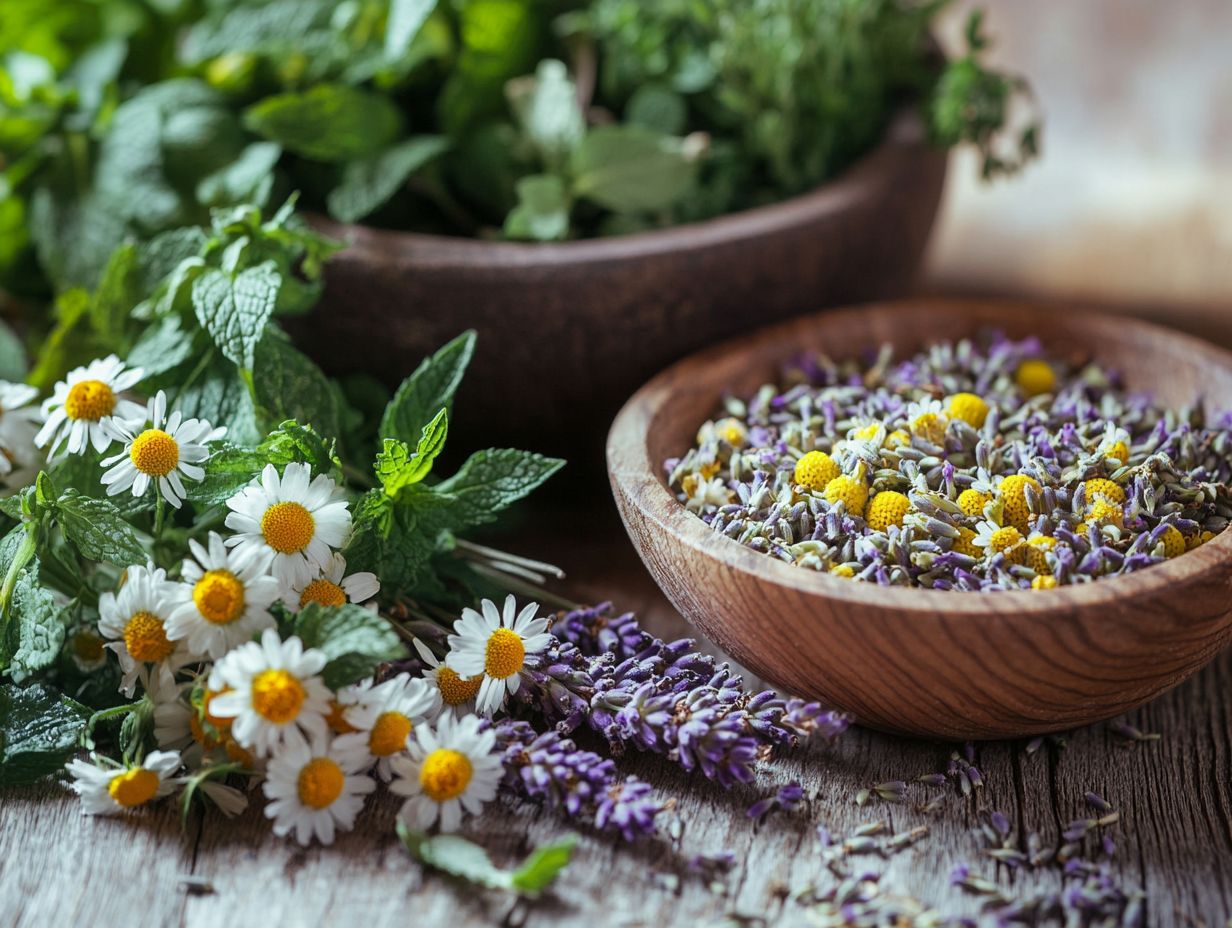
- Incorporating certain herbs, including ginger and peppermint, into your daily routine can help prevent and reduce the frequency and intensity of headaches and migraines.
- Some herbs have specific benefits for migraine sufferers, such as reducing inflammation and promoting relaxation.
- Consulting with a healthcare professional is also crucial when using herbs for headaches, as they may interact with medications, including over-the-counter options, and have potential side effects.
Understanding Headaches and Migraines
Understanding headaches and migraines is crucial for achieving effective pain management and symptom relief, especially when considering dietary changes and stress management techniques. Migraines usually present as intense, throbbing pain, often accompanied by nausea and sensitivity to light.
They can greatly impact your quality of life and are frequently triggered by factors like stress, dietary changes, and chronic conditions that may require medical attention. It s essential to recognize the various types of headaches, such as tension and cluster headaches, to explore effective treatment options.
Adopting a comprehensive approach incorporating lifestyle changes and natural remedies like herbal supplements can significantly aid in managing these conditions and enhancing your overall well-being.
Types and Causes
There are several types of headaches you might encounter, including migraines, tension headaches, and cluster headaches. Each type has its own unique causes and symptoms, making understanding these variations essential for effective management.
Migraines, often marked by severe and debilitating pain, can be triggered by hormonal changes, specific foods, or certain stressors. In contrast, Tension headaches typically stem from muscle tension in the neck and shoulders, often linked to prolonged screen time or poor posture.
Cluster headaches, notorious for their intense pain and cyclical nature, may be triggered by alcohol consumption or smoking. Identifying your personal triggers be it caffeine, dietary changes, anxiety, or inflammation can significantly enhance your relief strategies.
Utilizing techniques from Traditional Chinese Medicine, a holistic approach to health that includes practices like acupuncture, can also be beneficial for prevention.
Herbs for Headache Relief
Herbs have long been celebrated in traditional medicine as powerful natural remedies for headache relief. They offer a range of therapeutic benefits while steering clear of the side effects commonly associated with prescription medications.
Embracing these time-honored solutions can provide a more holistic approach to wellness.
Top Herbs for Reducing Headaches

Several herbs stand out for their effectiveness in alleviating headaches, including butterbur, feverfew, ginger, valerian, and essential oils like peppermint and lavender.
These natural remedies provide relief and enhance your overall well-being. They serve as appealing alternatives to conventional medications.
For instance, butterbur is recognized for its ability to reduce the frequency and intensity of migraines when taken regularly in a standardized extract form. Feverfew has a rich history of use and is known for inhibiting inflammatory substances that contribute to headache pain. You’ll find it beneficial whether you opt for capsules or tea. Additionally, exploring natural remedies for headaches using herbs can provide you with more options to alleviate discomfort.
Ginger has properties that reduce inflammation, making it an excellent choice for tension headaches. Valerian helps relax your body and relieve tension that often triggers headaches. Essential oils like peppermint and lavender work wonders. You can use them in aromatherapy or apply them topically with a carrier oil for effective relief from headache symptoms, especially migraines. For more options, explore these 10 easy DIY herbal remedies for headaches.
How Herbs Can Help with Migraines
Herbs can significantly alleviate migraine attacks, providing symptom relief through natural remedies often overshadowed by pharmaceutical alternatives.
Embracing these herbal solutions offers a holistic approach to managing migraines. You can explore options like garlic and ginkgo biloba that are often overlooked.
Migraine-Specific Herbs and Their Benefits
Migraine-specific herbs like butterbur and feverfew have been scientifically shown to reduce the frequency and severity of migraine attacks.
These herbs, celebrated for their unique compounds, interest both clinical practitioners and those seeking natural avenues for relief. Butterbur contains petasin and isopetasin, which inhibit inflammation and blood vessel constriction linked to migraines. Feverfew features parthenolide, renowned for its analgesic and anti-inflammatory properties, and can be found in natural herbal solutions for migraines.
Numerous studies suggest integrating these herbs for relieving stress-induced tension into your treatment regimen may lead to notable improvements in your quality of life. To effectively incorporate these herbs, consider options like supplements or teas. Discuss with your healthcare provider to tailor your approach to your specific needs and to ensure a comprehensive migraine management strategy, including the potential side effects of herbal remedies.
Using Herbs for Headache Prevention
Incorporating herbs into your daily routine can effectively prevent headaches and enhance your overall wellness through natural methods like stress management and relaxation techniques.
By embracing these botanical remedies, you can elevate your health journey and tap into the power of nature for better well-being.
Incorporating Herbs into Your Daily Routine
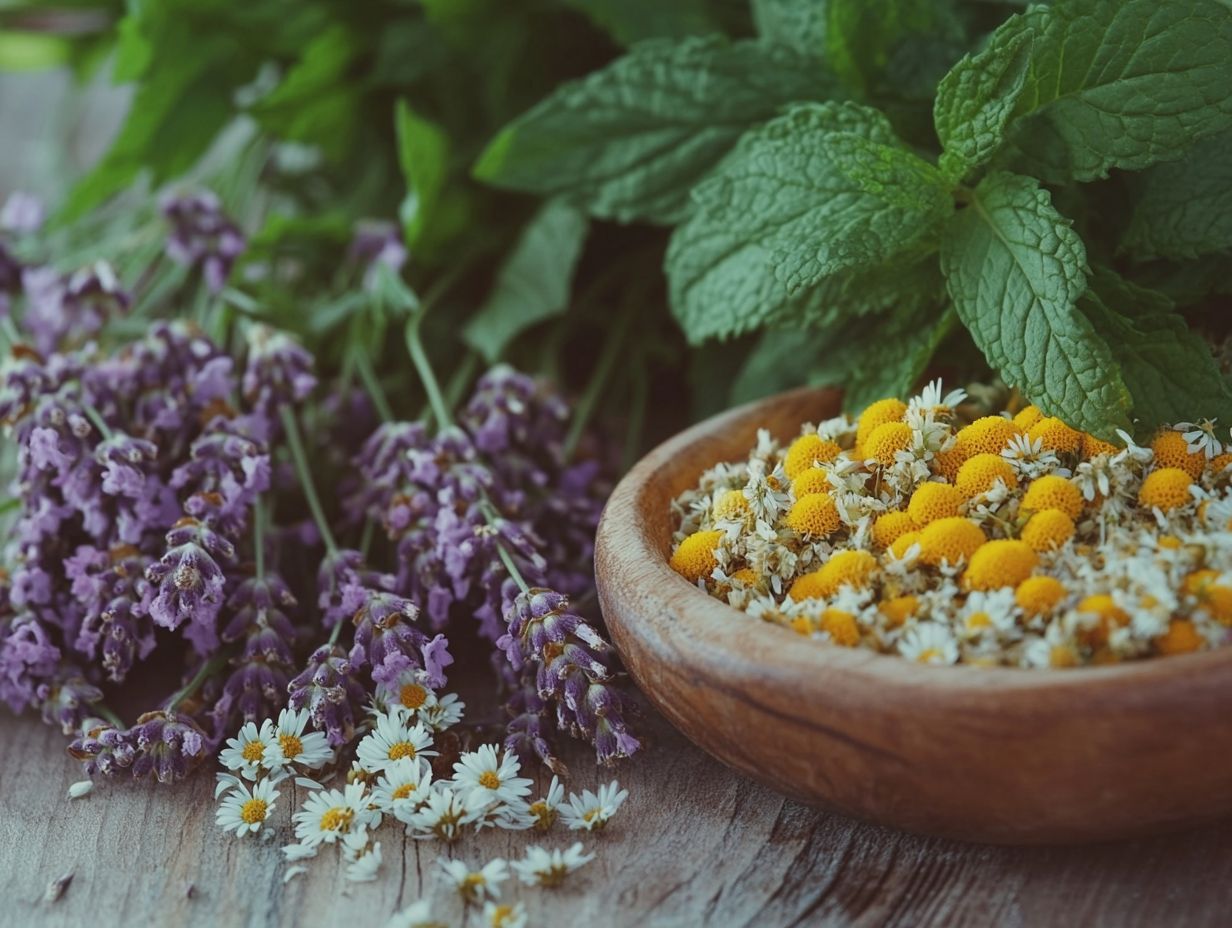
Kickstart your wellness by adding fresh herbs like peppermint or ginger to your meals! Not only do they elevate the flavor, but they may also help alleviate discomfort.
Consider brewing herbal teas made from chamomile or lemon balm to promote relaxation and create a soothing evening ritual.
If you’re ready to elevate your wellness journey, exploring high-quality herbal supplements can provide targeted benefits tailored to your needs. Consistency is key; regular use often leads to the best outcomes for pain management and overall well-being.
By embracing these straightforward techniques, including using nutritional supplements, you can turn the potential for improved health into a tangible reality. Start incorporating these herbs into your life now for a healthier tomorrow!
Potential Side Effects and Interactions
While herbal supplements may offer effective relief for headaches, it’s essential to remain vigilant about potential side effects and interactions with other medications.
Understanding these factors allows you to make informed decisions about your health and well-being, especially regarding the use of herbal medicine.
Cautionary Measures when Using Herbs for Headaches
When considering herbal remedies for headache relief, adhere to recommended dosages and stay vigilant about any potential side effects.
Many people seek solace in nature’s bounty think peppermint, feverfew, or willow bark. Don’t forget, these remedies can have negative effects if not used properly, particularly regarding dietary triggers.
Consulting a qualified medical professional can offer tailored guidance, ensuring that your herbal approach complements existing treatments without introducing unnecessary risks.
By understanding your unique health background and potential migraine triggers, you ll be better equipped to select the most effective remedy. This maximizes benefits while minimizing complications.
What works wonders for one person might not be suitable for another. Thoughtful consideration and proactive conversations with your healthcare providers are absolutely essential.
Frequently Asked Questions
What are some herbs that can help reduce headaches and migraines?
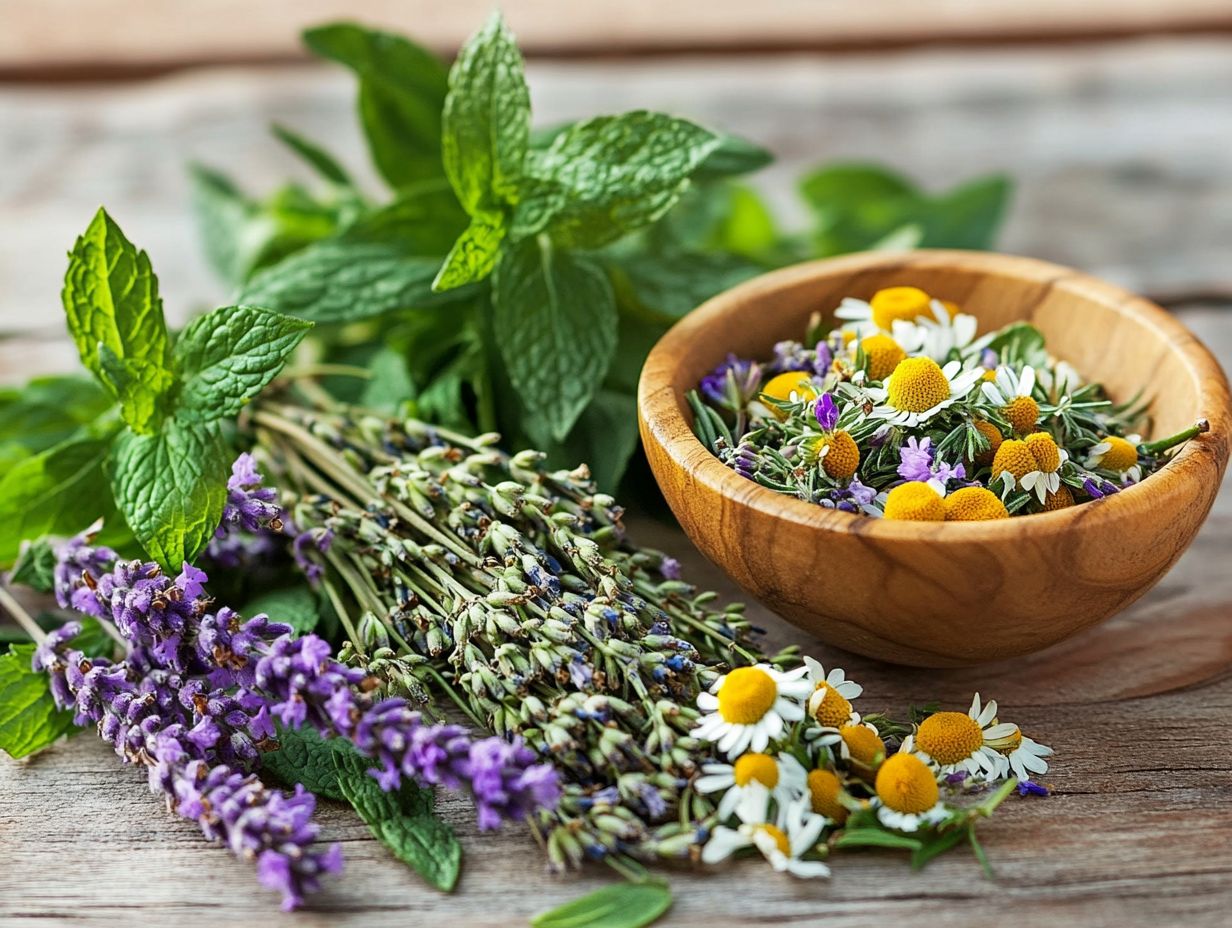
Some popular herbs for reducing headaches and migraines include feverfew, butterbur, peppermint, ginger, and lavender.
How does feverfew help with headaches and migraines?
Feverfew contains a compound called parthenolide, which reduces inflammation and pain. This makes it an effective herb for relieving headaches and migraines, especially during migraine attacks.
Can butterbur really help with migraines?
Yes, studies show that butterbur can be just as effective as prescription medications and over-the-counter options in reducing the frequency and intensity of migraines.
What is the best way to use peppermint for headaches and migraines?
Peppermint can be used in various forms, such as teas, essential oils, or topical creams, complementing other herbal remedies for headache relief. Inhaling peppermint oil can also provide quick relief for headaches and migraines.
Is it safe to use herbs for reducing headaches and migraines?
In general, herbs are considered safe when used in appropriate doses. However, always consult a healthcare professional before trying any new herb, especially if you are taking medications.
Are there any side effects to using herbs, such as butterbur and feverfew, for headaches and migraines?
Some may experience mild side effects like an upset stomach or dizziness when using certain herbs for headaches and migraines. Stop using the herb if these side effects occur and consult a healthcare professional.
Have you tried any of these herbs? Share your experience!
Ready to explore these natural solutions? Consult your healthcare professional today!

